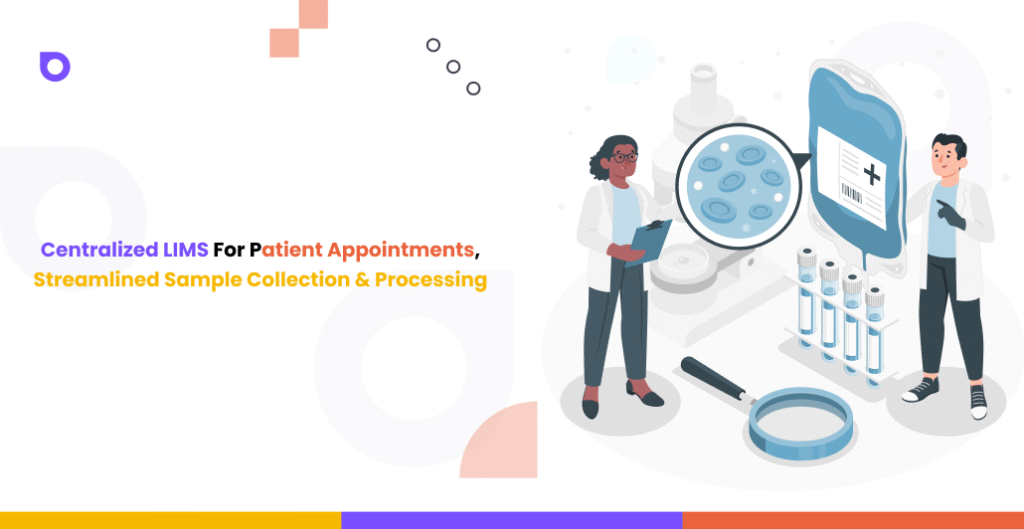The healthcare of today is precision, speed, and interdepartmental coordination, and a Laboratory Information Management System (LIMS) is at the center of delivering these expectations. Centralized LIMS allows hospitals and diagnostic labs to manage patient appointments, automate sample collection, and process sample operations, leading to faster diagnostics, efficient workflows, and improved patient outcomes. Pathology Lab Software, integrated laboratory billing software, and smart features of LIMS play in healthcare is key to operational excellence.
Centralized Patient Appointments
A centralized patient appointment system powered by a laboratory information management system significantly enhances operational workflow. From a single dashboard, administrators can schedule, track, and manage appointments across departments. A LIMS play in healthcare goes beyond bookings; it coordinates doctor availability, lab schedules, patient records, and even billing operations through seamless integration.
This minimizes errors caused by humans, maximizes healthcare staff utilization, and provides a seamless patient experience. With hospitals and diagnostic centers wanting automation, taking up pathology lab software that supports modules for appointments becomes inevitable.
Better patient communication is another advantage of laboratory information management systems. With auto-alarms and reminders, there are fewer missed appointments, which maximizes resource utilization. For multi-site operations, having a centralized system guarantees homogeneity and concerted operations.
- Unified Appointment Scheduling System
A centralized LIMS has a built-in appointment scheduling system that allows patients to easily book, reschedule, or cancel visits. With its built-in integration with pathology lab software and lab billing software, it offers real-time time slot, staff, and resource availability. Automated reminders and notices improve patient attendance with reduced administrative load.
Having a laboratory information management system also allows health centers to track patient preferences, history of previous visits, and medical history, optimizing each appointment to be more efficient and personalized.
- Decreased Waiting Time and No-Show Rates
Smart patient flow management through LIMS laboratory information management systems minimizes bottlenecks. Automated time slot booking, wait-time estimation, and dynamic queuing facilitate smooth patient flow. No-show rates decrease because of prompt SMS/email reminders.
This not only enhances patient satisfaction but also optimizes operating effectiveness. This is one of the key advantages of laboratory information management systems in clinical practice.
- Integrated Billing and Pre-authorization
Integrated Laboratory Billing Software in LIMS systems facilitates billing as part of the appointment process. Insurance information, pre-authorizations, and payments are all handled within the same interface.
This integration facilitates effortless processing, thereby saving time for staff and patients. In pharmacies, the laboratory information management system processes prescriptions and billing of lab tests in real-time, and there is end-to-end transparency.
Effortless Sample Collection and Processing
Streamlined sample collection and processing are central capabilities where a laboratory information management system shines. The moment a sample is collected, the LIMS allocates a unique identifier and starts monitoring it throughout its life cycle.
From transport to analysis and ultimately to result release, every step is automatically recorded. This provides complete traceability and accelerated diagnostics, one of the benefits of laboratory information management system.
Integration of laboratory billing software and Pathology Lab Software helps in smooth interaction of technical, administrative, and financial groups. Delays or discrepancies are automatically identified. In pharmacy settings, laboratory information management systems in pharmacies assist in handling chain-of-custody, particularly for controll samples or high-sensitivity samples.
Real-time dashboards create a graphic view of each process from the length of each test to technician utilization to turnaround bottlenecks. With this intelligent coordination, patient care is significantly enhance.
- Automated Sample Tracking
Utilizing a laboratory information management system, each sample is barcoded and digitally tracked from the collection point. This allows for real-time tracking and erases manual errors.
Through its LIMS role in healthcare, diagnoses can be traced back directly to source data, improving traceability and compliance. Particularly in pharmacies, the laboratory information management system in pharmacy enables sample integrity checks for specialized test workflows.
- Faster Turnaround Time for Diagnostics
The LIMS Laboratory Information Management System routes samples automatically depending on test type, workload, and availability of equipment. Results are auto-assigned and verified, lowering TAT (turnaround time) considerably.
This integration with software for pathology labs ensures that patient reports are provided faster and with greater accuracy, enhancing clinical decisions and treatment timelines.
- Real-time Data Synchronization & Reporting
Integrated laboratory billing software and data analytics within laboratory information management systems enable instant synching between sample status, laboratory reports, and billing.
This provides a live environment where data travels across departments in an instant, with timely interventions, auditing, and standards compliance. A solid LIMS play within healthcare also produces customized reports for patient records, laboratory audits, and quality assurance.
Conclusion
A centralised Laboratory Information Management System for patient scheduling, simplified sample collection, and processing redefines healthcare processes. With close integration of laboratory billing software, pathology lab software, and other important modules, an integrated laboratory information management system provides accurate data, process efficiency, and improved patient care.
The applications of laboratory information management systems range from clinical laboratories to hospital pharmacies, eliminating errors, delays, and redundancies. With the growing function of LIMS in healthcare, it is even more important that healthcare providers embrace contemporary systems that not only perform data management but also improve care delivery. Strategic implementation of a lims laboratory information management system provides scalable, compliant, and patient-focused healthcare services.


